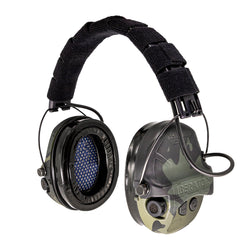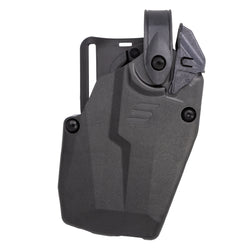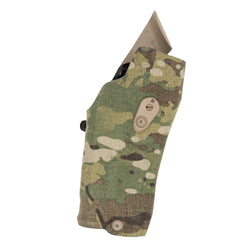The 1911 pistol is America’s most iconic handgun. With more than a century of use, it remains a top-selling handgun today. Originally designed to fire the .45 ACP, the 1911 pistol is now available in multiple calibers including .22, 38 Super, 9mm, 10mm, and more. Originally designed for war, the 1911 handgun is now used by many for competition shooting, self-defense, home defense, and collecting.
Another well-known, and more modern version of the 1911 is the 2011 handgun. Made popular by high-end firearms maker, Staccato, the 2011 has soared in popularity in recent years. This is partly due to how it maintains the original look, function, and feel of the 1911 — but with modern features. The most notable of those features is the double-stack magazine, which allows it to carry more ammunition than a 1911.
While the 2011 pistol is viewed as a modern version of the 1911, many consider it a separate category of handgun. In recent years, the number of companies manufacturing the 1911 and 2011 has increased.
History of the 1911
At the request of the US Military, legendary firearms inventor John Moses Browning created the 1911 handgun in 1910. A patent was granted on February 14, 1911, and the new pistol was adopted by the US Army on March 29, 1911.
The original manufacturer of the 1911 .45 ACP handgun was Colt, who obtained the manufacturing license from Browning. As the first semi-auto handgun to replace the outdated .38 caliber pistol, it was designated the M1911 by the US Army.

After being adopted by the US Army, the US Navy and USMC adopted the Colt 1911 as well. The infamous handgun remained the standard issue sidearm for the military until 1985. It was then replaced by the Beretta M9, a 9mm handgun. During this remarkable stretch, the 1911 pistol was used in some of the deadliest wars the US has ever seen. This includes WWI, WWII, the Korean War, and the Vietnam War.
Even though the 1911 pistol was replaced by the military in 1985, it is still used by specialized units of the armed forces. It has also remained a favorite by American gun owners around the country. The 1911 9mm pistol is among the most popular for civilians and is available in multiple sizes.
1911 Handguns in today’s America
Today’s 1911 handguns are remarkably unchanged when looking at their overall design and function. A new model may have an upgraded trigger, hammer, sights, etc. But it still functions the same and many are made to specifications.
The designation of “Government,” “Commander,” or similar configurations are built to the same specifications for that style. In other words, a new 1911 that is made to Government 1911 specs will fit the same 1911 holster as an older model.

Even though the fundamentals and internal parts have changed very little, companies producing new models are focusing on cosmetics. The finish of the gun, sights, and design milled into the slide and frame give each pistol a customized look. Today’s 1911 handguns come from a mixture of US and foreign manufacturers and range drastically in price. Even though many companies make 1911 handguns, most parts are made to specification and will work in other 1911 pistols.
Stepping outside the full-size, mil-spec 1911 model, compact and micro-sized 1911 pistols have also become very popular among those wishing to carry a 1911-style gun concealed. Companies like Kimber make .380 and 9mm 1911 pistols that are easy to conceal and carry daily.
Optics-ready 1911 handguns in 2025
As pistol mounted optics continue to grow in popularity, two major gun manufactures announced optics ready 1911 pistols during SHOT Show 2025. While optics cutouts on 2011 pistols are more common, not as many 1911 handguns come with removable optics plates. This is, however, a trend that is expected to continue as companies seek to offer more customization and modifications to their 1911 handguns.
Colt Optics-Ready 1911
Colt is one of the most recognizable names in the gun industry and they have been making 1911 pistols from the beginning. With a line of competition family pistols, Colt now offers an optics-ready 1911 in .45 ACP and 9mm. Made from a 70 series pistol, the OR (optics ready) pistol comes with three adaptor plates to allow for the most popular footprints being used today. This competition-grade pistol comes with three mags and three adapter plates and is expected to start shipping in April 2025.
Springfield Armory AOS line of pistols
Springfield Armory released its version of 1911 optics-ready handguns in a collaboration with 1911 Agency Optic Systems. With this collaboration, Springfield Armory is offering multiple versions of their 1911 handguns with the AOS system.
Any 1911 that carries the AOS designation will come with a cover plate and requires an adaptor plate for the optic desired. Adaptor plates are available for popular footprints like the RMR, RMSc, Aimpoint ACRO, and more. Each adaptor plate has the rear sight fixed to it using a dove-tail system. This was done to ensure the front and back sights properly co-witness with the optic you select.

The modern 2011 handgun
A 2011 handgun is derived from a 1911 pistol but with changes that are beyond cosmetic. As mentioned above, the most notable change is the grip design which utilizes a double-stack magazine.
The term “2011” was made popular by Staccato, who owns a trademark on the term. But even without the designation printed on a gun, newer double-stack 1911s are commonly referred to as “2011” handguns. The most popular choice for Americans who want a modern 1911-style handgun that holds more ammo is a 2011 handgun 9mm.

Like 1911s, 2011-style handguns vary greatly in price, although they run higher on average than 1911 pistols. Some of the most popular manufacturers on the market for 2011-style handguns include Staccato, Night Hawk, Springfield Armory, Atlas, Bul Armory, and more.
Because of their wider frame, 2011-style pistols are less popular for use as concealed-carry handguns. But that doesn’t mean they are not popular in other areas like competition, home defense, and collecting.
But even a larger 2011 handgun can be carried for self-defense. I know of a guy who carries a Springfield Armory Prodigy in a shoulder holster and sometimes a duty holster. The Prodigy uses a polymer grip module that attaches to a steel frame. It comes ready to mount an optic and has three choices of magazines, 17, 20, and a 26-rounder for those wanting lots of ammo.
New 2011 Handguns for 2025
Several new models of 2011-style handguns were released in early 2025, showing the popularity of the double-stack handgun is only growing.
Kimber announced a high-end competition-grade version they call the 2K11 Target. This pistol has a new GT trigger, Stan Chen Cotoms mag-well, and patent pending toolless guide rod. With an MSRP of $2,595.00, it will appeal more to the competition and collector shooters.

Another new 2011 handgun that stood out was the Watchtower 9mm Apache. This double-stack 1911 handgun comes with a lifetime warranty, PVD coating, ambidextrous safety selectors, and Kevlar & Carbon fiber grip. A competition-grade gun, the Apache is made in the USA and has an MSRP of $3,599.00.
An obvious trend is the number of companies producing competition-grade 1911 and 2011 handguns. The market for standard and compact sizes, however, also appears to be strong and doesn’t show any signs of slowing down.
While some of the high-end versions get a lot of attention, there are plenty of affordable 2011 handguns on the market. Companies like Rock Island, who makes the Tac Ultra SF HC Serries and Girsan, who make the Witness2311, produce affordable models.
1911 vs 2011 handguns
Since Staccato released the first “2011” handgun, there has been an enormous debate between the 2011 handgun vs 1911. There are several things for a buyer to consider when making a purchase.
First, 1911 handgun magazines are compatible (in general) making them more universal than 2011 handguns. The ammo capacity, however, is limited with 1911 handguns. For example, a 2011 handgun .45 ACP, will typically hold 13-15 rounds. A traditional 1911 .45 ACP holds eight rounds. Unlike 1911’s, 2011 handgun parts are not compatible across the board.
Another thing to consider when deciding between a 2011 and 1911 pistol for everyday carry (EDC) is the size of the gun. A 1911 is thinner, which makes it easier to conceal. 2011 handguns are bulkier, which could make them harder to conceal, depending on the type of holster being used and the clothing being worn. For example, a leather shoulder holster may allow a person to conceal a 2011 handgun more easily than a traditional belt holster.
1911 and 2011 single-action handguns
A major difference between 1911 and 2011 handguns compared to modern striker-fired guns is the action, and how the gun must be carried. When Glock introduced the striker-fired polymer handgun in the 80s, it started a new age of weapons.
Striker-fired handguns are not full double-action pistols, but they are not single-action either. 1911 and 2011 handguns are single-action only, meaning the trigger will only release the hammer from a cocked position. If the hammer is down, the gun will not fire.

Because of this, a 1911 or 2011 handgun must be carried “locked and cocked” which is carrying it with the hammer pulled all the way to the rear. Some people are uncomfortable with this and prefer to carry a double-action pistol instead. A double-action trigger allows the user to pull the trigger even when the hammer is down. The trigger pull cocks the hammer and releases it with one pull.
To de-cock a 1911 or 2011 handgun, first make sure the gun is unloaded and the chamber is empty. Next, pull the hammer back, and while pulling on the hammer, pull the trigger and slowly let the hammer down while the trigger is pulled. Caution is advised when attempting to de-cock a loaded single-action handgun because the gun can discharge if the hammer slips from the user’s thumb while attempting to let it down.
Summary
Choosing between a 1911 and 2011 handgun can be challenging, and there are many factors to consider. Those who want to upgrade or customize their handgun will have more options with a 1911. However, parts and accessories for 2011s will likely become more common in the future as companies continue to produce them.
Price is another factor. Since they are made with metal or aluminum frames, they tend to cost more. While they cost more, 1911 and 2011 handguns are considered to be among the most durable and long-lasting handguns you can purchase.









